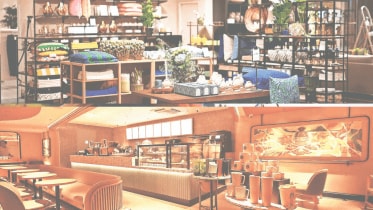Tata Starbucks’ first experiential store, which opened in New Delhi recently, is, as the name suggests, an experience in itself. A customer can make his or her own coffee with a choice of five different espresso beans. Additionally, the product offering, store design and service experience are dedicated to and inspired by India. Think Malabar coconut cream latte from Kerala, cinnamon jaggery latte with organic jaggery sourced from Maharashtra; or cocoa bird’s eye chilli latte inspired from Meghalaya—with Punjabi floral motifs in the background.
“The launch represents celebration of Indian coffee heritage through variety, artistry and food theatre, complimented by a host of international coffee offerings,” says Sushant Dash, CEO, Tata Starbucks.
Similarly, Swedish fashion retailer H&M has introduced omnichannel features like ‘scan & buy’ and ‘visual search’ to scan items in-store to purchase online or use image recognition to find similar products offline. This integration offers greater convenience, ensuring customers have access to a range of products.
“We are investing in store rebuilds to modernise spaces and enhance the overall customer experience. This enhances store layouts, making them easier to navigate and pleasant for customers. The ‘Home’ concept in select stores is expanding our product offering. A key aspect of our strategy is ensuring consistency in content and messaging across our physical and digital channels,” says Amit Kothari, head of customer activation and marketing, H&M India.
In a bid to enhance the culinary experience of customers, gourmet food store brand Foodstories, owned by Avni Biyani Jhunjhunwala and Ashni Biyani, has curated eight zones offering regional dishes from Mexico, besides DIY taco kits, sampling stations and interactive learning sessions of tequila production at its store in Ambience Mall in Vasant Kunj, Delhi.
Brands like Tata Starbucks, H&M and Foodstories are trying to redefine retail by engaging customers on a deeper level and creating a transactional as well as memorable experience. The retail marketing strategy, known as experiential retail, goes beyond traditional shopping to include personalised interactions and tailored in-store offerings, all in a bid to foster brand loyalty.
“The consumer enters the store after extensive online research, product comparisons, and reading reviews. They seek an immersive experience to confirm their choices,” says Varun Malik, marketing head, Shalimar Paints, whose brand offers live demo kits, paint panels, expert advice, and digital shade visualisation tools to customers as these elements help to make confident decisions, building trust and fostering long-term loyalty and growth for the company.
Luxury menswear designer Kunal Rawal’s stores across India—Mumbai, Delhi and Hyderabad—serve the dual purpose of retail and an event platform. “Just like my designs are traditional and functional wear for multiple occasions, the store is designed as a utility space that can be converted into an event space. The hydraulic leather and conveyor belt-inspired racks move around making space to host events,” adds Rawal.
Rajiv Lamba, co-founder and CEO of NeuroSensum, a consumer research company, quotes an example of a leading fashion retailer who launched an interactive wardrobe solution to simplify product discovery with real-time insights into consumer shopping goals and consumer mood.
“Most brands’ strategies rely on real-time feedback and behavioural insights, enabling them to refine their approaches effectively. This fosters positive word-of-mouth and social media buzz, setting brands apart in a competitive landscape,” adds Lamba.
From restaurant brands like Monkey Bar in Delhi offering espresso coffee made right at the table or DLF Malls hosting Active series, a curated platform with multiple engaging activities for Delhi-NCR consumers, the experience is supposed to be immersive.
“We have converted malls into fitness zones and activity areas. Following the success of Active Noida and Active Gurugram, we started Active Delhi this year to organise runs, zumba, yoga, etc, and partner with sports brands like Nike, Adidas and Puma to hold active pop-up wellness zones in DLF Promenade, Cyberhub, DLF Avenue and Horizon Plaza in Gurugram,” says Pushpa Bector, senior executive director and business head, DLF Retail, that is also launching a mall loyalty programme to provide compelling incentives for consumers.
Instagrammable spots, installations and backdrops designed specifically for social media sharing also encourage footfall among Gen Z and Gen Alpha consumers who interact, share their experiences online and promote the mall. “This has resulted in strong footfall and revenue growth across our portfolio and given us the confidence to invest in new projects in Goa, Gurugram and Hyderabad, which will see DLF double its space presence in the next two years,” adds Bector.
Although not a new concept across the world, going beyond its stylish furniture range in India, Swedish home furnishings retail giant IKEA recently introduced its iconic hot dogs at its in-store restaurant. It is for consumers to experience creativity in not just design but retail offering a ‘Swe-desi’ experience in veggie and chicken versions at an affordable pricing of Rs 49 and Rs 79, respectively.
“Food has been a key attraction drawing more visitors to stores beyond our regular shoppers, a segment currently contributing to 8-10% of sales share in India. New food offerings are centred around meaningful affordability (best in quality, convenience and low price) and will be a strong visitation driver, contributing to our vision of creating a trusted IKEA in India,” says Ankit Ghai, country food manager, IKEA India. The brand plans to double up the sales contribution in the future and this launch is the first big step in this direction, he adds.
Knowing well that customers and their living situations are different and so are their homes and needs, IKEA offers in-store experiences based on market to market. “For example, in Mumbai, we focus on small space living with multifunctional spaces, while in Hyderabad the focus is on multi-generational living, more on comfort and luxury,” says Jasmeet Sood, country home furnishing & retail design manager, IKEA India.
